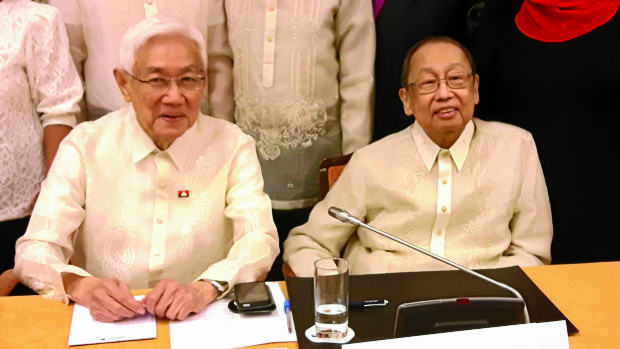CPP supports peace talks, warns against ‘peace-spoilers’

REBEL PANEL National Democratic Front of the Philippines’ senior adviser Luis Jalandoni (left) and chief political consultant Jose Maria Sison, who founded the Communist Party of the Philippines, meet members of the government panel during the opening of the fourth round of peace talks in The Netherlands on Monday. —AFP
The Communist Party of the Philippines (CPP) on Tuesday called on its political wing, the National Democratic Front of the Philippines (NDFP), and the government to speed up negotiations to end nearly 50 years of rebellion but warned that “peace-spoilers” and preconditions set by President Duterte could derail the talks.
In The Netherlands, where the fourth round of formal talks opened on Monday, CPP founder Jose Maria Sison, chief political consultant of the NDFP in the talks, said the rebels would reject preconditions that could undermine their position.
“NDFP will resist any attempt of the [government] at making it submit to capitulation, mere pacification or self-destruction,” Sison said in an online interview late on Monday.
The President on Sunday set four preconditions for the fourth round of talks, including the forging of bilateral truce and the release of soldiers and policemen held by the New People’s Army. He also demanded an end to the rebels’ revolutionary tax collection and territorial claims.
Military establishment
In a separate statement on Tuesday, the CPP congratulated the NDFP and the government negotiating panels for pushing through with the fourth round of talks “despite the peace-spoiling by stooges of US imperialism in the military establishment,” referring to Defense Secretary Delfin Lorenzana, National Security Adviser Hermogenes Esperon and Armed Forces of the Philippines Chief of Staff Gen. Eduardo Año.
Article continues after this advertisementLorenzana tagged the rebels as “terrorists” and he and senior officers of the AFP also insisted on a bilateral ceasefire agreement before resuming the talks, the CPP said.
Article continues after this advertisementThe President set other conditions that had pushed the talks “to the brink,” but to the credit of the flexibility of the two peace panels the negotiations moved ahead despite the preconditions, it said.
“For peace talks to continue moving forward … President Duterte must reject the insistence of the militarists to prematurely push a bilateral ceasefire agreement even before agreements on substantive issues are forged,” the CPP said. “Discussions on the more crucial socioeconomic issues, which the GRP panel also considers the meat of the negotiations, should not be preempted.”
“The CPP and all revolutionary forces call for acceleration of negotiations to forge an agreement on comprehensive socioeconomic reforms, which are at the root of the armed conflict,” it added.
Discussions on a bilateral ceasefire could come “as a consequence” of the Comprehensive Agreement on Social and Economic Reforms (Caser) and the Comprehensive Agreement on Political and Constitutional Reforms (CAPCR), it said.
Sison said both parties “should (move) ahead of the issue of ceasefire, the social, economic, political and constitutional reforms demanded by the people and needed to address the roots of the civil war.”
By setting the preconditions for the talks, Mr. Duterte and the government were “just maximizing their demands in the press,” he said.
Sison said the specific policy issues that were important to both sides would determine the “concrete content” of the range of their respective minimum and a maximum negotiating stance.
“For instance, ceasefire is a policy issue,” Sison said. “There must be flexibility in determining what kind of ceasefire can be accepted by the negotiating parties. What are circumstances and requirements for that ceasefire?”
Release of political prisoners
In his opening remarks at the opening of the talks in The Netherlands on Monday, Sison said the immediate forging of a bilateral truce would depend “if President Duterte can put forward the amnesty and release of all political prisoners listed by the NDFP.”
Despite all the challenges and hurdles to the talks, Sison expressed hope that the government and NDFP would agree and sign two major agreements in the latest round of negotiations—the Caser and the bilateral ceasefire.
He indicated that after reading and studying the draft proposals, both sides could reach an agreement. “I observe that there are enough concurrences and similar positions as common ground for forging the agreements,” he said in his speech.
He said, however, that “as a matter of principle” Caser should come ahead of the ceasefire agreement “unless these agreements can be signed at the same time by the panels and then by the principals.”